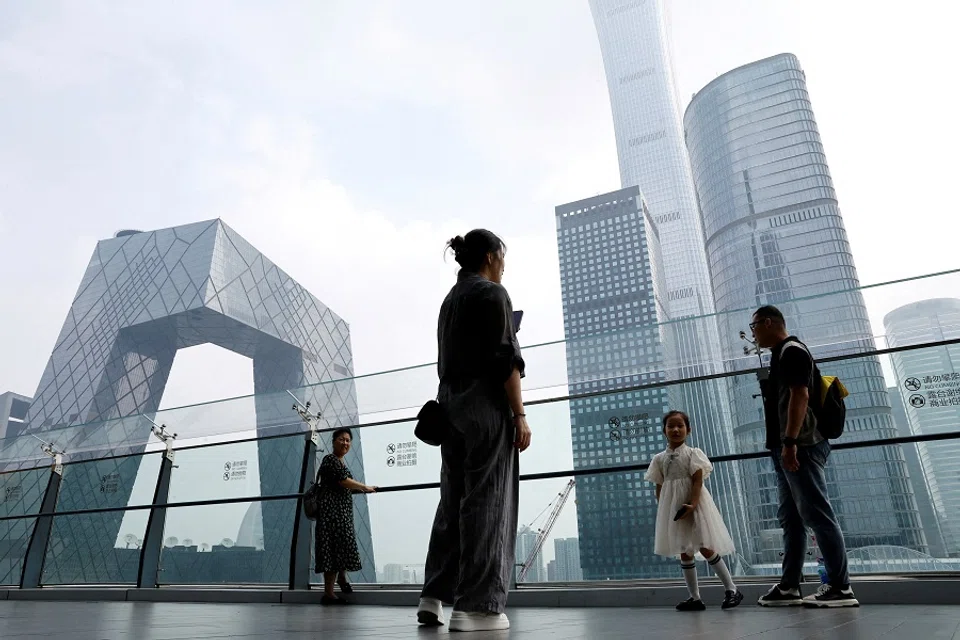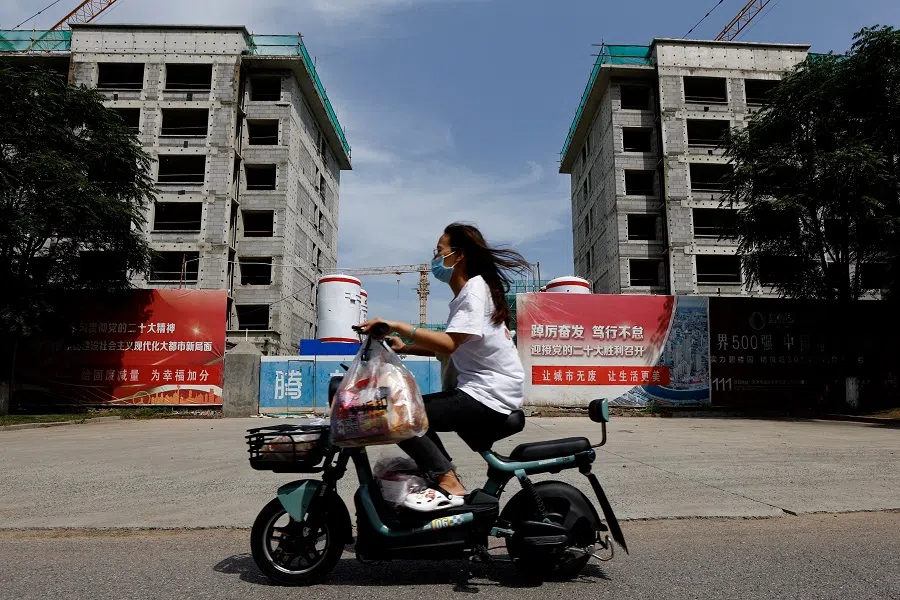Is China's development losing steam?
The world is concerned that the Chinese people are beginning to lose confidence in China's future, dampening the prospects for sustainable development. Researcher Wei Da believes that there is little connection between this crisis of confidence and the cyclical boom and bust of the economy, but China's severe economic problems are ultimately political problems.

China is currently faltering from domestic concerns and external threats, as the various economic indicators and data continue to decline. The world is concerned that the Chinese people are beginning to lose confidence in the future.
It is common economic knowledge that confidence is the basic driving force for sustainable development. By investing 100 RMB (US$14) in the stock market today, a stock investor expects it to become 300 RMB in a year and 1,000 RMB in three years. This is a basic show of confidence in stock market growth.
Losing confidence
The concepts of investing and gambling are different, as are the psychological expectations. Gambling is essentially a game behaviour predominated by irrational factors, and the majority of gamblers have no set expectation for success or failure. In contrast, the stock market's inherent logic is propped up by macroeconomic considerations and microeconomic performance of companies. Hence, if people lose confidence in the stock market, it implies that they have also lost confidence in the economy and its future prospects.
There are generally two explanations for low confidence in the economy. First, despite being in good shape, it is maligned and discredited by others. Second, the economy has lost its way and has only itself to blame.
What happens when people lose confidence in the stock market and the economy? Divestment, cashing out, deflation and collapse - the same as the entertainment or sports stars who have reached the end of their careers. While the latter may be able to hang on to past glories, in people's assessment of the economy, current economic performance and future expectations are given more weight than past successes. A weak economic performance with a dim future will rapidly exhaust its accumulated reserves and plunge itself into the abyss of passivity and decline.

There are generally two explanations for low confidence in the economy. First, despite being in good shape, it is maligned and discredited by others. Second, the economy has lost its way and has only itself to blame.
A result of malignment?
To be fair, while the maligning by others may have an impact on confidence, it is by no means decisive. This is because a true level of confidence comes mainly from one's own strength, and the fundamental way to win is through constant effort to improve and endeavour by every means to excel.
Take for instance the recent 2023 FIBA Basketball World Cup. The chances of the men's teams from Japan and China, as Asian teams, were generally not optimistic before the tournament. The Japanese team won global praise and respect from basketball fans with its several turnaround victories and fighting spirit. However, the Chinese team, inferior to other teams and in the doldrums, suffered repeated defeats and was roundly criticised and mocked.
Observers believe that the sports is not like gambling as one can predict likely outcomes from each team's routine training standards and performance during past competitions. If a certain sport in China is not meeting its key performance indicators and news of corruption overshadows achievements, the outcome can only be recurrent defeats. It has little to do with whether others support or criticise the sport.
Of course, the current crisis of confidence in China's economy is far more severe and complex than the defeats in sports tournaments.
The general consensus is that China's severe economic problems are ultimately political problems.
Economic problems are ultimately political problems
I believe that there is little connection between this crisis of confidence and the cyclical boom and bust of the economy. The general consensus is that China's severe economic problems are ultimately political problems. The currently low confidence in economic prospects is mainly due to a disillusionment with the political outlook.

Through careful observation in the past decade, the outside world finally understood and grasped some of Chinese politics' "true colours",which often deviate from, or even conflict with, modern civilisation and values.
For example, individual ownership or individual property rights (also known in China as "private ownership" or 私有制) is the crux of modern society, democracy, freedom and the rule of law. Without strict legal protection and respect for individual property rights, it will be impossible to build a truly modern society with a modern economy, human rights, freedom, the rule of law and justice. Individual property rights underline the people's right to be masters of their own destiny.
China's fundamentalist ideology in the acknowledgement and approach towards individual property rights is enough to give the modern world the shivers, and the sense of having to go separate ways as there is no shared cause or goal. This, in essence, is disillusionment.
Unfortunately, it is difficult to bridge or alleviate a crisis of confidence once it gets to the point of disillusionment.
Disillusionment leading to collapse
For example, in the traumatic shadows of the Great Depression in the West, socialist and communist ideas and practices were popular for some time after the Soviet Union's victory in the Anti-Fascist War upon the conclusion of the Second World War. The recent Hollywood blockbuster Oppenheimer described this historical background, highlighting the people's confidence in the Soviet model and ideal as well as the rivalry between the Eastern Bloc and the West.
However, as the Cold War deepened, the Soviet Union's long-standing weaknesses and flaws were increasingly exposed, such as the Great Purge by Stalin, the rigid dogma of the planned economy, the reliance on the police and falsehoods in governance, the corruption and decadence of the nomenklatura, the external military aggression, and the cultural intolerance even for the novel Doctor Zhivago. With the people's increased disillusionment with this system, the Soviet Union finally collapsed in 1991.

Using survey data, the US mainstream media recently highlighted that Chinese households, which constitute the basic engine of consumption in China, are experiencing a major crisis of confidence. The real reasons for the current economic slowdown lie in the unusual weaknesses in consumer prices, consumer expenditure, and investments in the services and real estate sectors.
These have affected household spending power, drastically reducing households' consumption and their willingness to take risks, resulting in a reluctance to spend or a tendency to spend as little as possible. This is a self-reinforcing vicious circle that will also damage other parts of the economy by directly affecting consumption and indirectly affecting investment. Household borrowing (mainly through mortgage loans) has been helping real estate developers with insufficient funds and local governments to maintain their operations, and this huge pillar of consumption is currently collapsing.
... Chinese household savings are much higher than before Covid-19, implying that increased consumption or property purchase are not a household priority. This is tantamount to a severe crisis of confidence.
China losing steam
In a chain reaction, as Chinese households tighten their belts and pay off mortgages quickly, the services sector - China's main engine of employment - has rapidly shrunk due to the authorities' crackdown in recent years. In the second quarter of this year, the services and construction sectors have greatly suffered, and the manufacturing sector is threatened by stagnation. These have resulted in a youth unemployment rate of over 20%, according to official statistics.
Consequently, the battered employment market and real estate sector have given rise to widespread pessimism. Currently, Chinese household savings are much higher than before Covid-19, implying that increased consumption or property purchase are not a household priority. This is tantamount to a severe crisis of confidence.

Under these circumstances, the political and economic circles in the West have indeed started to speak poorly of China's development prospects. In the past years, the US elites viewed China's economy as booming, as the US economy became somewhat fragile and declined. The consensus was that China would surpass the US in the medium term to become the largest global economy. However, many are now less convinced of this prospect.
The G7 now believes that China has lost steam and that China's development is starting to decline due to the many domestic structural difficulties. This has enabled the West to regain confidence in the competition with China.
... what is terrifying is that there is no sign that China currently has an effective approach or strategies to deal with the crisis.
China's strategies?
A top US think tank has also concluded that the focus of the US seems to have flipped from a concern with the seemingly unstoppable rise of Chinese power to a worry about the irrevocable decline of China's economy and population. It is said that this latest belief has been gaining traction among senior officials in the Biden administration. This probably explains why Biden himself has publicly commented that "China is a ticking time bomb" in his speech at a recent fundraiser.
I believe that an economic crisis itself is not fearsome. However, what is terrifying is that there is no sign that China currently has an effective approach or strategies to deal with the crisis. The existing approach and measures have not only been repeatedly proven to be useless but have also continuously aggravated the crisis. If this persists, the future prospects and possible changes in China may well exceed our imagination.
This article was first published in Lianhe Zaobao as "中国失去发展信心了吗?".
Related: Chinese property market: Second wind or brief respite? | The dangerous link between China's real estate demise, the economy and the financial system | China's new measures to attract foreign capital may not be enough to boost confidence | Crisis of trust underlies Chinese private sector's unwillingness to invest | Struggling economy now a taboo topic in China





